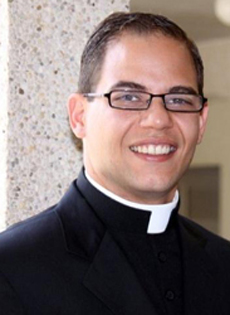
What is life like in the seminary?
Monday, September 8, 2008
*Father Luis A. Rivero
Greetings to all!
This question — what is life like in the seminary — is relatively normal in my personal experience. Those who know me on a personal level understand that I am an avid fan of Starbucks Coffee, in particular the one I frequent often, which my friends have humorously named my “satellite office” or my “Hemingway spot.”
It is there that I have established wonderful friendships and oftentimes am presented with the opportunity to evangelize, that is to educate, both the faithful and those who are curious about Catholicism. Furthermore, God has graced me with the opportunity to engage in beautiful dialogue with a great variety of people from all different walks of life. The conversation often times begins with the usual small talk, “what do you do?” Upon hearing my response, their interest peaks and further questions emerge.
So you also may ask, “What is life like in the seminary?”
The seminary is a place where seminarians live and work to foster the vocation that we are called to. The structure is built on four pillars: human, spiritual, intellectual and pastoral.
Imagine a great big family — imagine your very own family — in which there are many different personalities, opinions, outlooks, approaches, stress levels, interests, etc. If you sit back and contemplate such things you’ll have an idea of what seminary life is like at the human level. We live a normal life and must have our feet grounded in reality.
There are scheduled times for us to pray both as a community and personally. On a daily basis, we gather at least three times a day to pray the Liturgy of the Hours and participate in the celebration of the Eucharist. Furthermore, we all have a spiritual director who aids us in fostering our relationship with God and with each other. This is an important factor in priestly formation because even though we learn about God the important thing is to encounter the living God on a daily basis.
I had a professor who often said: “Gentlemen, the people of God deserve intelligent and holy priests.” Therefore, he would often stress the importance of developing our intellect. Holy Mother Church throughout the history of the world has seen the importance of education. In the formation of priests, it is important to be educated in the various disciplines that the human person may be interested in. Furthermore, the priest, as a witness of Christ and acting in the person of Christ, must point out the fact that not only is faith reasonable but perhaps the most reasonable of all the options. Daily classes, organized following the model of any other university, as well as conferences and workshops, all serve as part of our academic development.
Philosophy and theology, the two major disciplines we develop in seminary, remain abstract if we do not put them into practice. Therefore the program for priestly formation highlights the importance of pastoral work. We go out once or twice a week for a couple of hours and put our theology or philosophy into practice. We often go to a place that is partnered with the seminary pastoral formation team to help teach us the basics of pastoral ministry. Such sites along with the pastoral formation team help us to learn from our mistakes.
The key to seminary life is balance. Seminary formation is structured so that when we are in fulltime ministry as priests we have the discipline to structure our day and our time. We also have leisure and many opportunities to build relationships, learn and serve each other, be it in the basketball court, watching a film, playing cards, going out to dinner or Starbucks, etc.
I have been in seminary for 7 years now and the many experiences I have had have helped me grow as a person and learn from the many mistakes I have made. Furthermore, I have grown not only to love the Church more but to understand that in my weaknesses, in my failings, the Lord always shows His face through me and most importantly to me. In essence the seminary, from the Latin seminarium, is a place where we foster the seeds of our vocation; where we grow as human beings and understand that we must look for our happiness, our destiny, our 100-fold, here and now.
Luis Rivero
Seminarian, St. Vincent de Paul Regional Seminary, Boynton Beach


Comments from readers
Thank you for your response. I also think we should consider the words of the Constitution on the Sacred Liturgy. The call for all the faithful to have a "good understanding of the rites and prayers " so that "they should take part in the sacred liturgy." However, many of us ARE strangers to the mysteries of the faith even though the liturgy is in the vernacular. I was shocked to learn that in February of this year a survey taken by Georgetown Universtity found that 43% of CATHOLICS polled did not believe that Christ was truly present in the Eucharist. (Bread and wine are symbols of Jesus, but Jesus is not really present.)
That is just awful.
You also raise another good point. Since "It is not appropriate to speak of these two versions of the Roman Missal as if ther were "two rites." Rather, it is a matter of a twofold use of one and the same rite." (Letter to Accompany Summorum Pontificum) Does that mean that we are called to understand both?
With regards to training. I am aware that the priests of the FSSP in the Venice Diocese are very generous in helping to train priests with faculties here in South Florida, no previous experience is necessary. Have you ever attended Mass in the Extraordinary Form? If so, what was your impression?
Thanks again for your blog
Luis
faithandreasoninmiami.blogspot.com
Thanks be to God I am doing very well. Thank you for your prayers for my brothers and I. Prayers are much needed to endure on the path towards our vocation.
Patty,
Thank you for your kind words. Continue to pray that I and those whom are called to the ministerial priesthood never lose that �Yes!�
Luis and Michael,
The seminary offers a course in Ecclesiastical Latin that may aid those in wishing to celebrate the Extraordinary Form, although there is much more to it and somewhat a bit more complex than just saying the words.
As we are reminded in the documents of the Second Vatican Council: �The Church, therefore, earnestly desires that Christ�s faithful, when present at this mystery of faith, should not be there as strangers or silent spectators. On the contrary, through a good understanding of the rites and prayers they should take part in the sacred action.� (SC 48.)
I can�t speak for my brothers but I can say that personally if I am in an assignment and a good number of the faithful ask for the Extraordinary Form I would find a way to be properly trained, and I would ask them to join me in the training following what the Sacred Council calls for. We all have to do the work!
Seminary is a long and arduous journey in which we prepare for ministerial priesthood. After high school it is anywhere from 9 to 10 years of studies and if they were to add a couple of years to be properly trained in celebrating the Extraordinary Form we�d be in seminary for over a decade!!
I have a question for you following closely with a previously asked question. In addition to the 1962 Missal which I assisted and assit at daily both when I lived in Miami and now in Missouri, is there discussion towards the standards given by our Holy Father in the opening phases of his reform. These would of course include offering the New Rite in the same direction the people are facing, with more Latin, with Communion received kneeling, etc. I am curious about this. When I left Miami I know that most seminarians nto just in Miami but in many areas I had visited were very sympathetic to this. It certainly was welcome news as I am now 21 and have labored for all of these things since early in my teenage years, especially what came into full view of the faithful with the publication of Summorum Pontificum. What say you?
Thanks
Is the seminary offering any training in the Extraordinary Form using the 1962 Missal as provided in Summorum Pontificum and are there any seminarians who have shown interest? Thank you for your blog.
Luis
faithandreasoninmiami.blogspot.com
Patty
PS: I'm glad I was able to share w/ you last Sunday at your "satellite office." :)
Allow me to say that first and foremost your questions are very good and you are entitled to more than a trite answer. I hope and pray that the following lines do not fall under the category of trite.
With that said, I can only answer your questions from my experience. My answer in no way shape or form can grasp the experience of my brother seminarians or priests. That is the beauty of the Lord, not only does He work in mysterious ways but He also works in a unique way with all of us.
When you have asked these questions I was quickly led on a journey down memory lane in which I asked the very same question to my pastor, of blessed memory. I recall the day, the time and the place when I inquired �Msgr., how did you know you wanted to become a priest, how did you know the Lord was calling you?� His answer was very simple, he said �I ask myself that every morning. Every morning when I get out of bed I ask the Lord �what is it that you want of me today?�� I pondered on that for a while.
I was called to the priesthood through a variety of ways. Ways that at the moment I did not recognize but in hindsight I can see the Lord was calling me. Perhaps the most important ones are service, love, education, happiness and destiny. My need for all of these things that find their origin in God lead me to refine my vocation, a process that started formally in the seminary when I was 18.
As a normal teenager I struggled in the discernment process considering a family of my own, a wife, children, a career, etc. Yet the pivotal point was to see those things that can only come from God and ultimately bring me happiness.
There is so much more that I can add but we will save that for another blog�stay tuned and soon enough I will share my complete vocation story and answer all your questions with more detail.
Elizabeth,
thank your kind words. Certainly Coffee is a gift, it keeps me attentive and alert for His work...
Veronica,
Thank you for your support and friendship. You know how to reach me and the *$'s is waiting.
Mirian,
Thanks for the prayers and good wishes. Please remember to pray for my brother seminarians throughout the province and for those already in ordained ministry. I promise that you all will find out when the end of seminary approaches, its at that point that all of us need prayers the most so please don't take the Newly Ordained off those Prayer lists!!!
I'm veri proud of you! =)
Pax et Bonem!